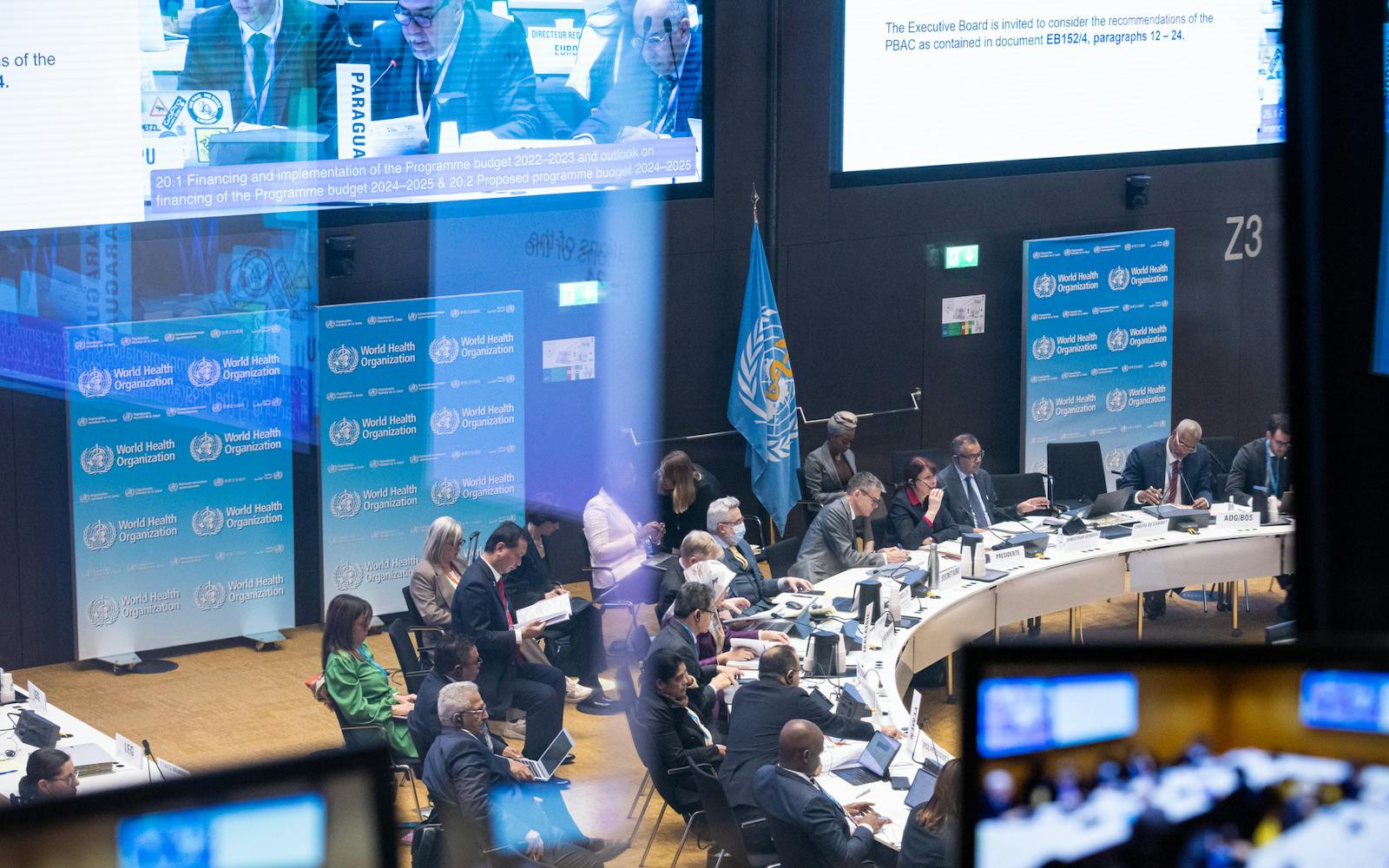
Authorities officers and delegates collect on the 152nd session of the WHO Govt Board on the UN company’s headquarters in Geneva, Switzerland, in January 2023. Picture: WHO / Pierre Albouy
Because the world confronts a rising variety of unprecedented and unpredictable threats to our collective well-being, authorities officers and dignitaries will collect in Geneva this month to put out a plan to guard and promote world well being in 2024.
Each January, the Govt Board of the World Well being Group (WHO) meets on the UN company’s headquarters in Switzerland to ascertain priorities for the yr forward and set the agenda for the World Well being Meeting in Might, when all 194 UN Member States convene to drive world progress towards higher well being for everybody, in all places.
Proper now battle, excessive climate, and rising ranges of meals insecurity and poverty are wreaking havoc on our well being, particularly probably the most weak amongst us, whereas testing the worldwide neighborhood’s capability and political will to reply. The upcoming Board assembly is anticipated to cowl a variety of challenges, from the influence of violence in Gaza and Ukraine to the consequences of plastic and chemical air pollution on the human physique, in addition to main milestones this yr, just like the fiftieth anniversary of the UN’s expanded immunization program. Underpinning all of that is the pressing want for common well being protection.
2024 can also be anticipated to be a serious yr for immunization, with the rollout of two new malaria vaccines and two new polio vaccines, bringing the world nearer to eradicating a number of the planet’s deadliest illnesses.
One other huge but microscopic risk that can high the agenda: antimicrobial resistance, a well being threat that is aware of no borders and would require a whole-of-UN response.
This yr may additionally witness main reforms in how WHO is funded and a possible overhaul within the company’s strategy to emergency prevention, preparedness, and response.
Forward of this month’s assembly, I spoke with two UN Basis colleagues, Senior Director for International Well being Lori Sloate and International Well being Coverage Officer Molly Moss, about probably the most crucial points on this yr’s agenda.
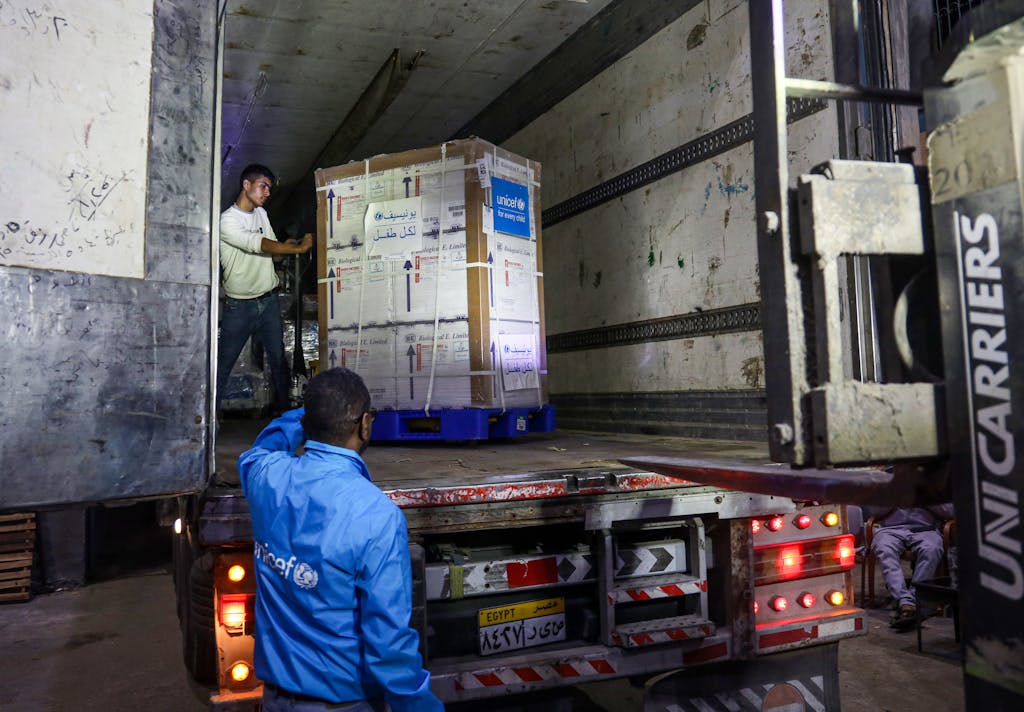
A cargo of vaccines is unloaded in Gaza as a part of an emergency response by UNICEF and different companions to guard Palestinian kids who’ve missed routine childhood immunizations towards measles, pneumonia, polio on account of the continued battle. Picture: UNICEF / Eyad El Baba
HUMANITARIAN CRISES
Throughout a particular session in December, WHO’s Govt Board adopted a decision on Gaza calling for “instant, sustained and unimpeded passage of humanitarian reduction, together with the entry of medical personnel.” And at the newest World Well being Meeting in Might, the company handed a decision condemning the violence in Ukraine and calling for Russia to cease attacking well being services.
How will WHO’s Govt Board deal with these crises together with different escalating humanitarian well being care wants all around the world?
Lori: WHO is the main UN company for well being, so it primarily serves because the well being cluster lead within the Palestinian territories and works with numerous companions, together with different UN companies, governments, and well being authorities. Though entry in Gaza is proscribed, WHO is coordinating efforts, together with direct provision of medical provides, logistics, and help for pressing lifesaving wants. WHO additionally negotiates to guard well being care employees, hospitals, and well being services. In Ukraine, WHO has delivered an estimated $120 million value of well being provides since March 2023, reaching roughly 7 million folks.
Molly: As time goes on, we’re seeing WHO as extra of an operational actor in battle and disaster settings. Whether or not it’s delivering tons of medical provides or surging a well being workforce or conducting surveillance of assaults on well being care, there may be an more and more operational factor to what WHO does. The scenario in Gaza is a really clear instance of that, however there are many different battle settings, like Afghanistan, Sudan, and Ukraine, the place WHO has been requested by UN Member States to step up and fill a void in humanitarian well being care. This yr’s agenda consists of the International Well being and Peace Initiative, which displays WHO’s rising function in humanitarian emergencies and descriptions a broader conceptual framework that acknowledges we will’t obtain well being when there isn’t any peace and we will’t obtain peace with out sturdy and sustainable well being techniques.
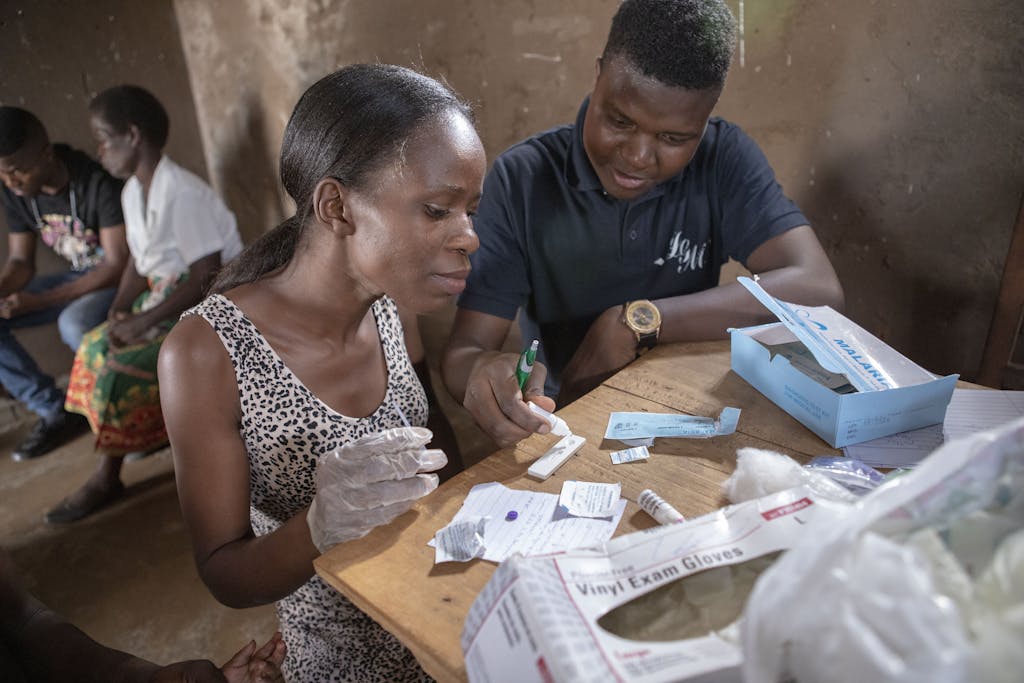
WHO gives pressing well being help after Cyclone Idai displaced 1000’s of individuals in Mozambique, Malawi and Zimbabwe in 2019, placing probably the most weak at elevated threat of malaria, typhoid and cholera. Picture: WHO / Mark Nieuwenhof
WHO IN EMERGENCIES
The Board will hear a brand new replace on strengthening world structure for Well being Emergency Prevention, Preparedness, Response and Resilience (HEPR) simply weeks earlier than the fourth anniversary of the COVID-19 pandemic outbreak. In the meantime, UN Member States are negotiating a pandemic accord.
Although the pandemic accord will not be an official agenda merchandise on the EB assembly, it will likely be one of many hottest subjects of debate. Are you able to shed some gentle on the place negotiations on the pandemic accord stand and what comes subsequent?
Molly: Though the accord will not be formally on the agenda, the co-chairs of the negotiation course of will present a quick, casual replace on the primary day of the EB assembly. All eyes are on the method as Member States embark on probably the most intense section of negotiations this February and March. One of the vital elementary sticking factors is the difficulty of mental property, particularly, how creating economies can create vaccines and different pandemic response merchandise that can allow them to mount their very own home or regional response and never depend upon high-income, developed economies for charity. One of many ways in which Member States have discovered traction on this challenge known as a Pathogen Entry and Profit-Sharing System. There’s a precedent for this method in how the world shares influenza samples by way of WHO’s International Influenza Surveillance and Response System.
The elephant within the room is that there are many nationwide elections in 2024, together with within the U.S., and the potential for modifications in political management. So the upcoming World Well being Meeting in Might is broadly seen as a tough deadline to finalize the pandemic accord.
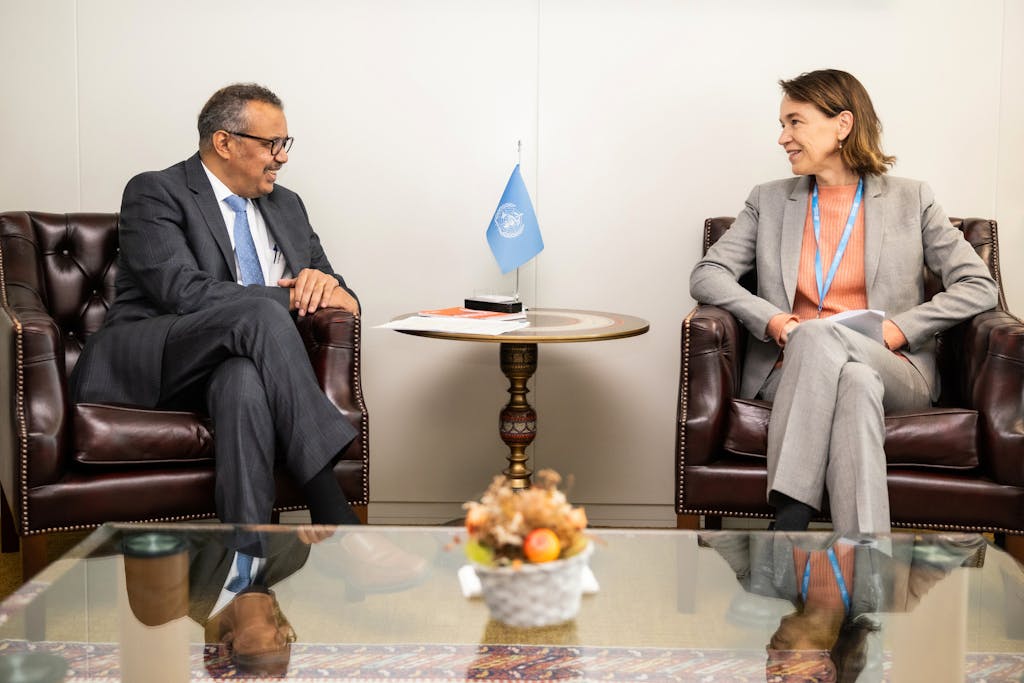
WHO Director-Common Dr. Tedros Adhanom Ghebreyesus meets with Olivia Wigzell, Sweden’s Director-Common of The Nationwide Board of Well being and Welfare, on the company’s Geneva headquarters to debate sustainable financing, the well being disaster in Ukraine, and the significance of prioritizing knowledge.
Picture: WHO / Pierre Albouy
FINANCING WHO
The long run effectiveness of WHO will largely depend upon altering how the company is funded, so it has extra sustainable, predictable, and versatile financing to satisfy the elevated expectations of what the company can ship. Progress has been made to extend the proportion of assessed contributions within the type of Member State dues, however way more flexibility and predictability in voluntary contributions can be wanted to satisfy this second.
How did COVID-19 speed up requires such reforms, and the way will the upcoming Board assembly transfer this course of ahead?
Molly: When the pandemic hit, WHO’s well being emergencies finances was grossly underfunded. Then all of a sudden, WHO had all of those international locations and residents world wide turning to the company and saying, “What will we do in response to COVID-19?” And the company had peanuts within the financial institution to mount a response. That’s why the COVID-19 Solidarity Response Fund turned so vital. COVID-19 actually did spark a reckoning inside WHO about what Member States anticipate it to do and what they really empower the company to do by way of their financing.
Lori: Beforehand, WHO’s finances was solely 16% funded by assessed contributions. By 2030, 50% of WHO’s finances will come from assessed contributions. However that also leaves the remaining half as voluntary and, subsequently, unpredictable and unsustainable. Voluntary contributions are mainly earmarked funding from Member States, the non-public sector, and philanthropies for particular initiatives they wish to fund. So in a big sense, WHO’s finances has been on the whim of donors, creating these pockets of poverty of their operations for which donors are much less inclined to designate funds. Immunization, for instance, is effectively financed, however then one thing like most cancers management will not be. WHO’s subsequent technique, often known as the “Common Program of Work,” will cowl 2025 to 2028 so the company is looking for as a lot funding as attainable — $7.1 billion — upfront to cowl that four-year interval, and for this funding to be as versatile as attainable.
On the similar time, you have got main replenishments taking place for the International Fund to Struggle AIDS, Tuberculosis and Malaria and GAVI, the Vaccine Alliance. Then, while you add unexpected emergencies and what’s taking place in Ukraine and Gaza together with local weather change, for instance, there are a variety of fiscal calls for on governments. And that creates a extremely difficult fiscal atmosphere for world well being.
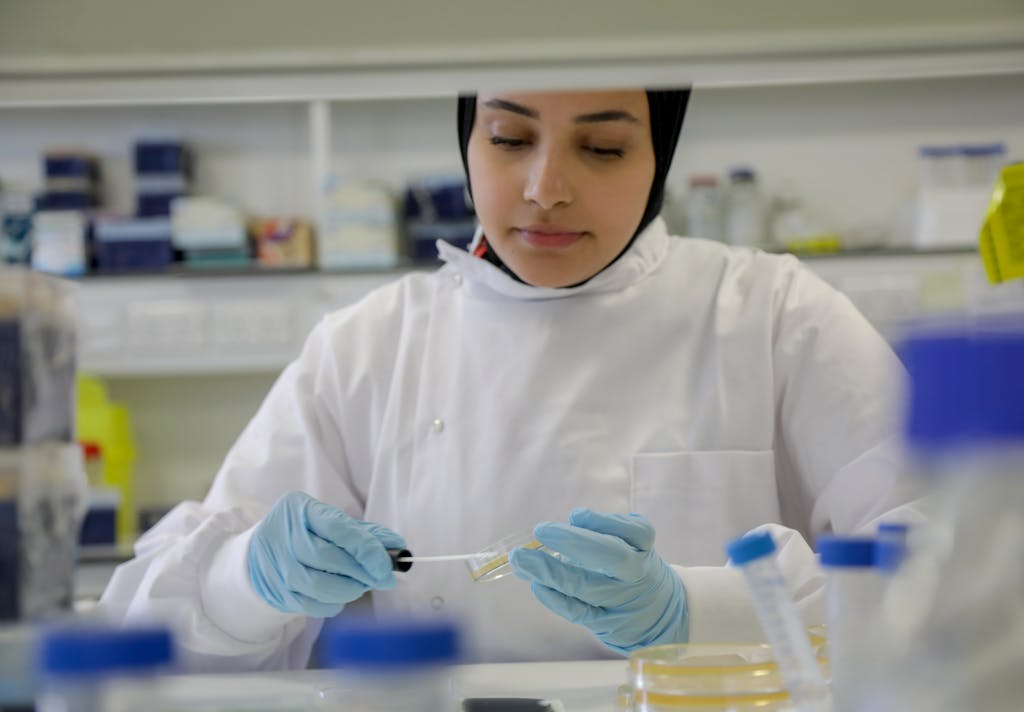
On the Liverpool Faculty of Tropical Medication, researchers are learning customized antimicrobial remedy as a option to stop and deal with AMR, a rising and world risk that undermines a long time of medical development. Picture: DFID / Will Crowne
ANTIMICROBIAL RESISTANCE
AMR threatens the core of recent drugs and places each nation in danger for the unfold of lethal infectious illness. WHO can be prioritizing the difficulty on the upcoming Board assembly.
Why now?
Molly: The rationale antimicrobial resistance is taking middle stage at this yr’s Govt Board assembly is threefold. First, AMR is a rising and existential risk, and it hasn’t seen the sort of sustained political consideration that it calls for. Second, WHO’s world motion plan on antimicrobial resistance, which was adopted in 2015, is coming to an finish in 2025. So Member States should be speaking this yr about what the following 10-year street map seems like. And the third motive is that there can be a Excessive-level Assembly on Antimicrobial Resistance on the UN Common Meeting in New York this September. So I believe 2024 will go a good distance towards placing AMR excessive on the agenda in several boards, together with exterior of the human well being house.
Lori: For context, there hasn’t been a Excessive-Degree Assembly on antimicrobial resistance on the UN since 2016, and rather a lot has occurred since then to coordinate the 4 UN companies that work immediately on this challenge: WHO, the UN Setting Programme, the World Organisation for Animal Well being, and the Meals and Agriculture Group. AMR cuts throughout many sectors and actors. How do you coordinate that agenda globally? I believe this yr’s Excessive-Degree assembly can be a bit extra programmatic in that international locations need to set targets for what they wish to obtain on the AMR agenda in 2024.
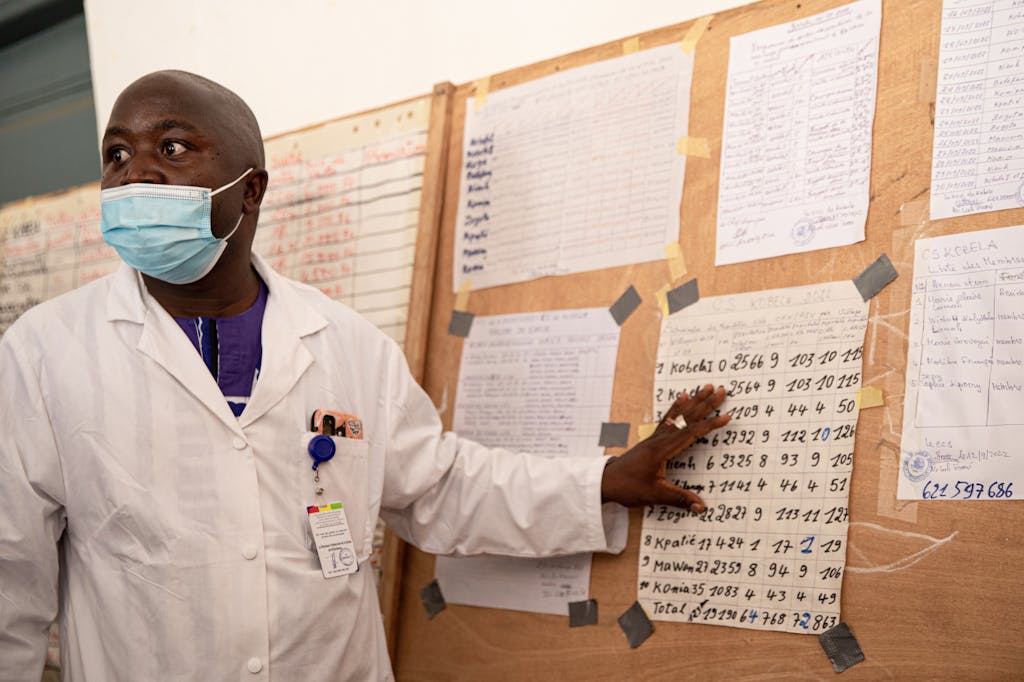
The top of the Kobéla Well being Middle in Guinea presents knowledge on native prenatal consultations and vaccination charges. Over the previous 20 years, Guinea’s Ministry of Well being and Public Hygiene has prioritized maternal, new child, and baby well being by way of extra accessible major well being care. Picture: UNICEF / Sibylle DesJardins
UNIVERSAL HEALTH COVERAGE
WHO and the World Financial institution not too long ago launched their newest world monitoring report on common well being protection (UHC), a vital goal for the Sustainable Improvement Targets. It discovered that over half of the planet’s inhabitants lacks entry to important medicines and that a good portion faces monetary hardship on account of unaffordable well being providers.
How will this sobering knowledge form the dialog in Geneva?
Molly: The information on this report reveals the stark actuality of the place we’re on the UHC agenda. The truth is, UN Member States convened a Excessive-Degree Assembly on UHC in the course of the 2023 Common Meeting in New York, the place governments dedicated to redoubling their efforts to attain UHC objectives. The Govt Board will ask governments what these commitments truly appear to be: What sort of funds do we have to make these a actuality? How are these funds going to be delivered to bear? Will it’s by way of nationwide budgets, official improvement help, or different sources? These are the sort of dialogue questions that UN Member States can be requested to mirror on.
Lori: Along with financing, the Govt Board will talk about how international locations plan to implement political commitments made beneath the UHC declaration. Member States agreed to redouble efforts to attain UHC by reorienting well being techniques by way of a PHC strategy. How are international locations going to do that and what are some examples of nations who’ve proven influence? It’ll be fascinating to see how this overarching problem comes up all through the agenda. And eventually, we anticipate there to be a decision on Institutionalizing social participation for well being and well-being.
Keep Knowledgeable
In search of the most recent updates on world well being and sustainable improvement? Join the UN Basis’s Unite for Well being e-newsletter, which tracks motion on the 2030 Agenda from the grassroots degree to UN Headquarters.
from Humanitarian activities – My Blog https://ift.tt/DlXvJZI
via IFTTT


